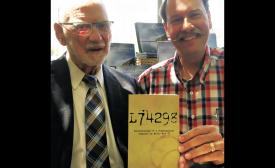Stories give insight into refugee experience
Canadians who sponsor refugees often discover that the task comes with surprises and challenges.
Canadians who sponsor refugees often discover that the task comes with surprises and challenges.
A new book invites readers to explore themes of loss and grief while imagining their own story.
“Who cares? The elderly among us... ” (length 1:27:30).
In the light of COVID-19, a panel explores how the pandemic has challenged systems that care for elders and offers insight into the experience of seniors. Part of the Face2Face series offered by Canadian Mennonite University at cmu.ca/face2face.
Indiscriminate use of social media is bad for us, warns Ed Cyzewski. While technology is convenient and promises to make us more efficient and keep us in touch with more people, it actually harms our mental health and does little to foster true relationships. Smartphones and other devices also hinder our spirituality, mostly by consuming our time.
When COVID-19 hit in March, Doris Daley of Trinity Mennonite Church in De Winton, Alta., decided to clean the house. Many families, stuck at home, have taken this “unprecedented time” to throw out expired food, wash the windows and clean out junk drawers. She chose to do a deep dive into old boxes that had been packed away in her storage closet for years.
Andrew Unger shot to fame after creating the Mennonite satire website, “The Daily Bonnet.” Now he is branching out, adding to his repertoire a longer feat: his first novel.
Using the metaphor of home, a new book relates the history of the Menno Simons Centre, a residence community for university students in Vancouver for more than 30 years.

When Kevin Drudge needed a children’s story for his church’s Sunday morning worship service, he decided to write one himself. But what began as a one-time occasion has become more than two dozen stories and a deal with a publisher.
After high school, Susanna Compton took a gap year before heading off to university. She turned that experience into her first published book.
The last time a history of Mennonites in Canada was published, it covered the period from 1920 to 1970—the year Pierre Trudeau was prime minister, Canada was converting to the metric system, the federal voting age was lowered to 18, and the October Crisis rocked Quebec.
It was a long time ago, in other words.
The Absent Christ is a clearly written and compelling exploration of Anabaptist-Mennonite theology that engages with both historical Anabaptist sources and contemporary political concerns, in order to advance a constructive argument centred on the figure of the empty tomb.
Unsettled with her status as a newly retired person, an archivist uses her skills to look into the difficult parts of her own family history. Along the way, she uncovers a shocking event that explains the intergenerational trauma in the family. The experience helps her learn to accept herself and love others more unconditionally.
Over the past 50 years, the Institute for Mennonite Studies at Anabaptist Mennonite Biblical Seminary, Elkhart, Ind., has published a series of books making primary works of the Radical Reformation available in English.
Eight years ago this fall, a group of 10 Korean Mennonites met at Sherbrooke Mennonite Church in Vancouver and decided to start a magazine. The publication would be a resource for Korean Anabaptists around the world and connect them to one another.
Once upon a time, living in splendid isolation, Mennonite men were moulded differently from the rest of society. Worshipping in a traditional peace church with a different set of values, they didn’t fit the western stereotype of a male. But today, Mennonite men are diverse; as much urban as rural, as much men of colour as white, and they have diverse views on politics, religion and lifestyle.
What was your response the last time a good friend asked you how you were doing? If you said with a laugh or a moan, “Too busy,” or just offered an eye roll, this book might be for you.

Gordon Toombs, left, was deceived by the Canadian military when he tried to register as a conscientious objector during the Second World War. His recent book, "L74298: Recollections of a Conscientious Objector in World War II," is dedicated to Conrad Stoesz, right, archivist at Winnipeg’s Mennonite Heritage Archives, in gratitude for revealing the deception.
Gordon Toombs was deceived by the Canadian military when he tried to register as a conscientious objector (CO) during the Second World War. His recent book, L74298: Recollections of a Conscientious Objector in World War II, is dedicated to Conrad Stoesz, archivist at Winnipeg’s Mennonite Heritage Archives, in gratitude for revealing the deception.
Still a hidden gem for some, CommonWord Bookstore and Resource Centre is a well of resources for the Mennonite community and beyond. One of the ways it shares these materials and guidance is through its “Cheaper by the dozen” program.
In a large city like Toronto, attending a church small group or Bible study may not be feasible for those with families or busy schedules. But Toronto United Mennonite Church has found a technological solution.
In mid-February, 50 Tanzanian Mennonite Church leaders, under the guidance of Palmer Becker, a Canadian Mennonite author and teacher, studied spiritual leadership, pastoral care and Anabaptist essentials using a translation of Becker’s book Begin Anew: Christian Discipleship Seminars.